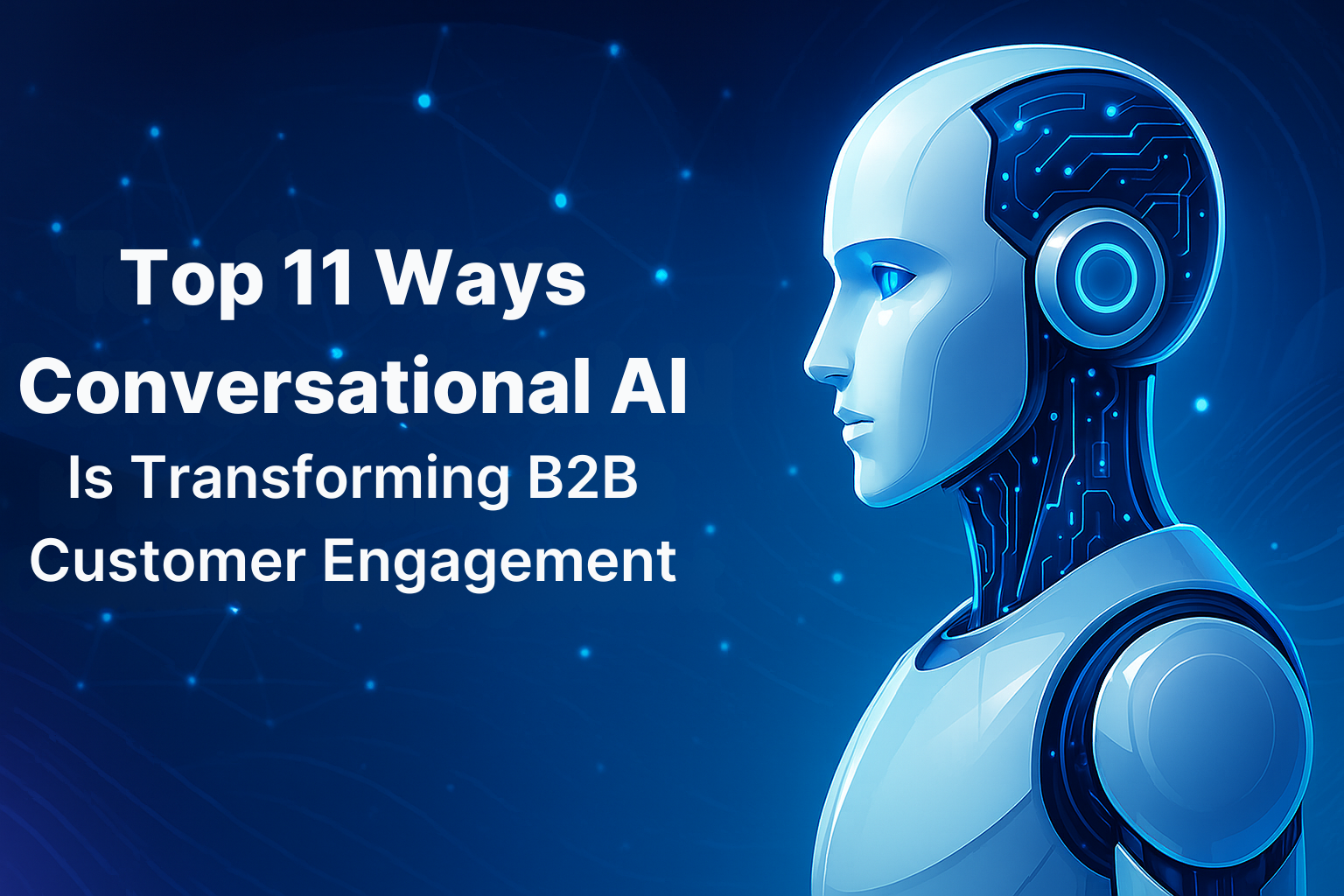
Introduction to Conversational AI in B2B
Conversational AI is no longer just a buzzword—it’s now a strategic powerhouse driving digital transformation across B2B marketplaces. Unlike traditional B2C applications, B2B businesses use AI chatbots and voicebots for more complex, high-value, and relationship-driven interactions.
With the ability to understand natural language, learn from data, and provide real-time, context-aware responses, conversational AI in B2B is empowering brands to engage smarter, respond faster, and sell better.
Let’s explore how this technology is reshaping B2B engagement across industries.
1. Personalized Customer Journeys at Scale
One of the biggest challenges in B2B marketing is delivering personalization at scale. Conversational AI enables businesses to tailor conversations based on the user’s role, intent, previous behavior, and buying stage.
AI bots can dynamically adjust tone, content, and suggestions—whether the user is a procurement head looking for pricing or a technical lead checking integrations.
-
Higher conversion rates
-
Improved user satisfaction
-
Reduced bounce rate
Example: An AI bot on a SaaS company’s pricing page can instantly personalize the conversation for enterprise vs. startup users, showcasing relevant plans and features.
2. Intelligent Lead Qualification and Scoring
Traditional lead qualification can be slow and manual. Conversational AI automates this by asking intelligent questions and instantly categorizing leads based on predefined scoring rules.
Chatbots integrated with CRM systems can identify buying intent and push hot leads directly to sales teams.
-
Auto-tagging based on responses
-
Real-time lead scoring
-
Sales-ready insights
Real Impact: B2B companies using AI report up to 30% increase in lead-to-opportunity conversion.
3. Always-On Customer Support with AI Chatbots
In the B2B space, clients expect 24/7 support for critical issues. Conversational AI ensures businesses never miss a query—be it pre-sale, post-sale, or technical support.
-
Ticket routing
-
Knowledge base integration
-
Escalation to human agents
Quote: “Our AI bot reduced our first-response time from 2 hours to under 2 minutes,” — VP, Customer Success, B2B SaaS firm.
4. Accelerating Sales Cycles with Smart Assistants
Conversational AI helps reduce friction in the buying process. From scheduling demos to guiding RFP processes, smart AI assistants act like a 24/7 sales concierge.
-
Auto-booking meetings
-
Follow-up reminders
-
Document sharing (e.g., case studies, whitepapers)
Impact: Sales cycles shortened by 20–40% when AI is used to handle routine touchpoints.
5. Reducing Response Time and Improving Satisfaction
Quick response is key in B2B, where deals often depend on timely information. Conversational AI cuts wait time and increases first-touch resolution.
-
Immediate answers to technical queries
-
Automated escalation for urgent issues
-
SLA compliance monitoring
Stat: B2B brands using conversational AI see 50% higher CSAT (Customer Satisfaction Score).
6. Streamlining Procurement and Order Management
Conversational bots can assist procurement teams in checking inventory, placing repeat orders, or getting supplier updates—without navigating complex dashboards.
-
Order tracking
-
Invoice generation
-
Vendor communication
This ensures fewer errors, faster turnaround, and improved procurement efficiency.
7. Enhancing Product Discovery and Recommendations
B2B catalogs are often dense. Conversational AI uses NLP and machine learning to guide users to the right product or configuration.
Example: A voicebot for an industrial supplier can understand “I need a 3-phase motor for 200 HP” and fetch matching products with specs.
-
Higher product discovery rates
-
Fewer abandoned sessions
8. AI-Powered Insights for Account-Based Marketing
Account-based marketing (ABM) relies on precision. Conversational AI helps by gathering intent signals, tracking behavioral data, and surfacing key insights.
-
Account engagement reports
-
Custom messaging recommendations
-
Ideal follow-up times
Marketing teams can then craft campaigns that feel one-to-one, even at scale.
9. Multilingual and Global Communication Capabilities
B2B is global, and language shouldn’t be a barrier. AI bots can handle real-time multilingual translation, enabling smooth interactions with clients across geographies.
-
Supports 100+ languages
-
Localized tone and references
-
Easy integration with global support teams
This empowers companies to deliver consistent support and sales experiences worldwide.
10. Seamless Integration with CRMs and Martech Tools
The true power of conversational AI comes alive when integrated with tools like Salesforce, HubSpot, Marketo, or custom ERPs.
-
Auto-logging interactions
-
Updating deal stages
-
Triggering workflows
This minimizes manual data entry and enhances the productivity of marketing and sales teams.
11. Data Security and Compliance with Enterprise AI
B2B conversations often involve sensitive information. Modern AI platforms offer enterprise-grade security including:
-
End-to-end encryption
-
GDPR and CCPA compliance
-
Role-based access control
With security built in, businesses can deploy conversational AI with confidence.
Real-World Use Cases: B2B Brands Winning with Conversational AI
-
Drift: Helps B2B SaaS companies like Snowflake and InVision automate lead capture and appointment scheduling.
-
HubSpot: Offers a powerful AI chatbot builder tightly integrated with CRM.
-
ServiceNow: Uses virtual agents for employee and customer support in large enterprises.
Read more on Drift’s Conversational Marketing Playbook.
Future Outlook: The Next Phase of B2B AI Evolution
As conversational AI matures, expect these next-gen capabilities:
-
Voice-led B2B sales assistants
-
Real-time AI coaching for reps
-
Emotional intelligence in chatbots
-
Predictive product recommendations
In short, AI will evolve from an assistant to a trusted co-pilot for B2B growth.
Frequently Asked Questions (FAQs)
B2B AI handles longer sales cycles, complex product queries, and multiple stakeholders, whereas B2C is more transactional.
Platforms like Drift, Intercom, and IBM Watson are commonly used due to enterprise integrations and security.
Yes, with cloud-based tools and pre-built templates, even SMEs can benefit without heavy investments.
Advanced bots trained on product documentation and FAQs can resolve most technical queries autonomously.
It captures intent data, segments users, and helps personalize messaging for high-value accounts.
Typical results include 30–50% increase in lead quality, 20–40% reduction in sales cycle time, and improved CSAT scores.
Conclusion
Conversational AI isn’t just a trend—it’s a transformative tool driving faster, smarter, and more personalized B2B engagement. From automating support to turbocharging sales and marketing alignment, its impact is undeniable.
B2B brands that embrace this technology now will lead in the coming era of AI-first commerce.

